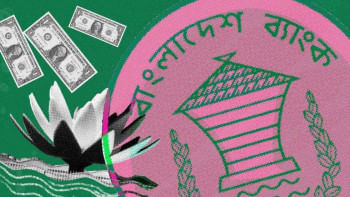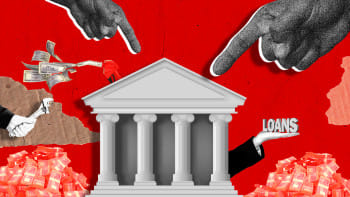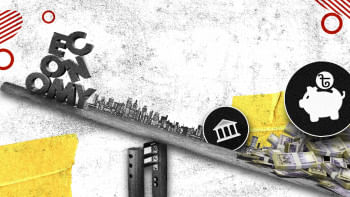The renaissance of Bangladesh Bank and some expectations

The newly appointed Bangladesh Bank (BB) governor, Dr Ahsan H Mansur, has effectively started the reformation of the country's banking sector without delay. This is most hopeful as it has long been overdue. The new governor, being a strong proponent of macroeconomic governance, started his day with the bitterest task of swooping down on the top financial hooligans who simply emptied the banking sector through a wholehearted pairing with corrupt politicians in power. An objective assessment of what is happening at the central bank heralds the advent of a dark chapter for the oligarchs who plundered both the capital market and numerous banks simultaneously under the interest of the past rulers.
What the governor has kicked off is no less than a renaissance since his actions have begun to storm the castles and forts of the economic mafia who never thought of being caught red-handed because they governed the government. His prime actions endorse the importance of correcting institutions before talking about theoretical aspects. Dr Mansur is a sound pro-market economist who has equal respect for Smithian ethical doctrines, and he has not deviated from that: his market-based rules for exchange and interest rates are a testimony to that. He has remained different from his predecessors by signalling to the market that he will go after the money launderers and bank looters before fixing theoretical macro irregularities.
The revival of Bangladesh Financial Intelligence Unit (BFIU) is also a significant move. BFIU was like a cat without teeth under the two previous governors, while the Anti-Corruption Commission (ACC) was like an anaemic tiger without claws. Both the institutions are prerequisites for the well-functioning of Bangladesh Bank. The political domestication of both BFIU and ACC impeded BB's desired actions in many regulatory aspects. The judicial tardiness of default litigations at higher courts eventually made BB dysfunctional as a financial regulator. That is why many economists advocated for BB to have some magisterial powers to punish the wrongdoers at its own discretion.
The political domestication of both BFIU and ACC impeded BB's desired actions in many regulatory aspects. The judicial tardiness of default litigations at higher courts eventually made BB dysfunctional as a financial regulator. That is why many economists advocated for BB to have some magisterial powers to punish the wrongdoers at its own discretion.
Although the new BB governor has infused blood into the BFIU, pairing with the ACC or higher courts remains beyond his capacity. And that bureaucratic labyrinth will again give refuge to the wrongdoers when the next elected regime begins. The time has come to make some reform so BB can complete the task of judgement and punishment within the financial regulatory framework. Going to the ACC or courts for straightforward financial verdicts is just a waste of time and energy—a rigmarole which eventually helps the culprits. This injustice induces new entrepreneurs to default wilfully since dishonesty pays better. People want an end to this culture to make the banking system fair and self-propelled. We believe the banking commission, which is presumably under construction, will figure out what to do in this respect to remove the trap of judicial bureaucracy.
The institutional damage done by the immediate past BB governor, who was forced to resign after the collapse of the Awami League regime, may be vast quantitatively, but qualitatively it is perverted and infectious. The lax rules he endorsed for the loan delinquents—such as getting rid of the stigma as a defaulter by only adjusting 5-10 percent of defaulted loan—are hard to reverse. The past governor, a retired bureaucrat with no background in economic scholarship but noted as a lobbyist, endorsed a Chattogram-based business group to engulf a couple of banks, as the BB has recently revealed.
The new governor's day dawns with the fight against that vicious conglomerate, which syphoned off millions of dollars from their possessed banks through terrible malpractice and the judicial impunity of the past government. This crusade will give the Bangladesh Bank a tough time. Economists who believe in ethics and politicians who respect minimum fairness must stand beside the new governor so he can bring some semblance of order in the country's banking system and punish the culprits by seizing their assets to adjust for their thefts. He wants to treat the cancer first before giving vitamins to the patient. And that makes him different from other policymakers.
We hope that the BB governor will continue the momentum and spirit to bring order and promote the economy. The prime objective of the central bank is to maximise employment and growth subject to maintaining a moderate level of inflation. The governor should require the banks to report their internal employment figures as well as annual profit figures. The banking administration will remain half-broken if the Financial Institutions Division (FID) at the finance ministry is not eliminated. The pay structure at banks is highly hierarchical and unfair. That must be addressed too. The interim government should appoint a competent leader at the competition commission, which is another example of a domesticated species with a retired bureaucrat at its helm. Institutional leadership must be merit-based, not just qualified for clerical work with unquestionable obedience.
Finally, Economic Adviser Dr Salehuddin Ahmed and BB Governor Dr Ahsan H Mansur must step in a highly measured way to form the banking commission, which will delink political clout from banking affairs for the sake of establishing a corporate culture so the financial sector can see some light at the end of the tunnel. To make it happen, the governor's position must be made constitutionally powerful to strike the final note of the renaissance.
Dr Birupaksha Paul is a professor of economics at the State University of New York at Cortland in the US.
Views expressed in this article are the author's own.
Follow The Daily Star Opinion on Facebook for the latest opinions, commentaries and analyses by experts and professionals. To contribute your article or letter to The Daily Star Opinion, see our guidelines for submission.

 For all latest news, follow The Daily Star's Google News channel.
For all latest news, follow The Daily Star's Google News channel. 











Comments